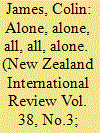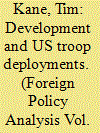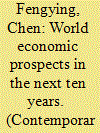| Srl | Item |
| 1 |
ID:
128922


|
|
|
| 2 |
ID:
114131


|
|
|
|
|
| Publication |
2012.
|
| Summary/Abstract |
For over six decades, the US military has shaped international economic development, notably by way of nearly 31 million US troop-year deployments since 1950. Worldwide, life expectancy increased by 10 years between 1970 and the present. The mortality rate of children dropped from 132 per 1,000 live births to 55. The number of telephone lines per capita quadrupled from 48 to 196 per thousand. In each case, the improvement was faster in countries with a heavy US troop presence and slower in countries with zero US troop presence. These relationships stem from a data set on US deployments across all countries and years from 1950 to the present matched with World Bank data on indicators of social well-being since 1970 across 148 countries. The positive relationship between American forces and social development holds in econometric regressions even when controlling for initial income levels and initial social indicator levels.
|
|
|
|
|
|
|
|
|
|
|
|
|
|
|
|
| 3 |
ID:
097941


|
|
|
| 4 |
ID:
131990


|
|
|
|
|
| Publication |
2014.
|
| Summary/Abstract |
Northern Ireland's current period of relative peace and political stability has been varyingly attributed to large amounts of international economic development assistance and the funding of grassroots peacebuilding work. Yet the post-accord peace is punctuated by seemingly sporadic and isolated acts of violence perpetrated by young people. Using the concept of accidental spoiling, we analyze the perceptions of 120 community group leaders and international funding program administrators pertaining to the causes and effects of persistent sectarian violence among Northern Irish youth and the effect of that violence on the long-term sustainability of peace in Northern Ireland. The views shared by this cross-section of civil society groups suggest that, although economic development assistance has provided opportunities to decrease the inequalities that contributed to the ethnopolitical conflict, low self-esteem, and low self-image, disrupted communities continue to fuel youth interest in violence, thereby raising the potential to harm the peace process. The article concludes by proposing that deeper social reorganizing objectives should be aimed for if Northern Ireland is really to achieve conflict transformation.
|
|
|
|
|
|
|
|
|
|
|
|
|
|
|
|